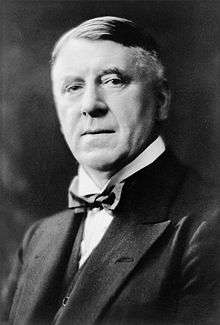Berkeley Moynihan, 1st Baron Moynihan

_001.jpg)
Berkeley George Andrew Moynihan, 1st Baron Moynihan KCMG CB FRCS (2 October 1865 – 7 September 1936), known as Sir Berkeley Moynihan, 1st Baronet, from 1922 to 1929, was a noted British abdominal surgeon.
Early Years
Moynihan was born in Malta in 1865, the son of Captain Andrew Moynihan, VC. His father died in 1867 and Moynihan moved with his mother to Leeds, Yorkshire. He was educated in Leeds and the Blue Coat School, Newgate Street, London (1875–1881).
Medical career
After two years at the Royal Naval School, Eltham, he returned to Leeds to study medicine at the Leeds School of Medicine. He graduated MB BS at the University of London in 1887 and joined Leeds General Infirmary as house surgeon. He was then successively demonstrator of anatomy in the Medical School (1893–96), assistant surgeon to the infirmary (1896), surgeon from 1906 and consulting surgeon from 1927 until his death.
In parallel with his appointment as surgeon, Moynihan was lecturer in surgery from 1896–1909, and from 1910–1927 Professor of Clinical Surgery (from 1925 Surgery) at the University of Leeds.[1]
By the end of the Great War Moynihan held the rank of major-general in the British Army and had been chairman of the Army Advisory Board from 1916 and chairman of the council of consultants 1916 to 1919.
He delivered the Bradshaw Lecture in 1920 and the Hunterian oration in 1927. He served as President of the Royal College of Surgeons of England from 1926 to 1932.
In 1935, a year before his death, Moynihan and Dr Killick Millard had founded the British Voluntary Euthanasia Society.[2]
Moynihan's surgery on Park Square, Leeds in the city centre still stands, now used as private offices. Their former use and connection to Moynihan is marked with a Leeds Civic Society blue plaque.
He would say that the perfect surgeon must have the heart of a lion and the hands of a lady, not the claws of a lion and the heart of a sheep. Or again, " Infinite gentleness, scrupulous care, light handling and purposeful, effective, quiet movements which are no more than a caress, are all necessary if an operation is to be the work of an artist and not merely of a hewer of flesh." -
Honours
Moynihan was knighted in 1912,[3] appointed a Companion of the Order of the Bath (CB) in 1917, a Knight Commander of the Order of St Michael & St George (KCMG) in 1918[4] and created a Baronet of Carr Manor in 1922.[5] On 19 March 1929 he was raised to the peerage as Baron Moynihan, of Leeds in the County of York.[6]
Family
Moynihan married Isabella Wellesley Jessop, the daughter of prominent Leeds surgeon Thomas Jessop, on 17 April 1895.[7] They had three children:[8][9]
- Hon Dorothy Wellesley Moynihan (born 1897)
- Hon Shelagh Berkeley Moynihan (born 1902), married Henry Wynn Parry, BCh in 1923[10]
- Patrick Berkeley Moynihan, 2nd Baron Moynihan (born 29 July 1906, died 30 April 1965)
Lady Moynihan died on 1 September 1936. Lord Moynihan died six days later at the age of 70 and was succeeded in the barony and baronetcy by his only son Patrick.
References
| Wikimedia Commons has media related to Sir Berkeley Moynihan Consulting Rooms, Park Place West, Leeds. |
- ↑ "Moynihan, Lord Berkeley: Papers and Case Books". Royal College of Surgeons. Retrieved 23 August 2010.
- ↑ Raymond Whiting, A Natural Right to Die: Twenty-Three Centuries of Debate (Westport, Connecticut, 2001), p. 41
- ↑ The London Gazette: no. 28626. p. 5081. 12 July 1912.
- ↑ The London Gazette: (Supplement) no. 30721. p. 6514. 3 June 1918.
- ↑ The London Gazette: no. 32733. p. 5593. 28 July 1022.
- ↑ The London Gazette: no. 33479. p. 1968. 22 March 1929.
- ↑ Oxford Dictionary of National Biography
- ↑ Freebmd search
- ↑ The Peerage, entry for 1st Baron Moynihan
- ↑ Armorial Families, entry for Moynihan
- Kidd, Charles, Williamson, David (editors). Debrett's Peerage and Baronetage (1990 edition). New York: St Martin's Press, 1990.
- Leigh Rayment's Peerage Pages
- Short biography of Lord Moynihan
- Biography of Lord Moynihan
| Peerage of the United Kingdom | ||
|---|---|---|
| Preceded by New Creation |
Baron Moynihan 1929–1936 |
Succeeded by Patrick Berkeley Moynihan |